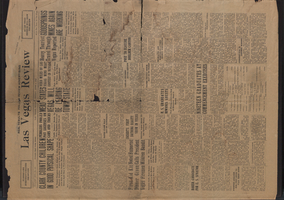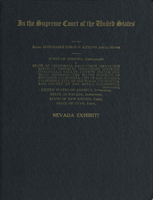Search the Special Collections and Archives Portal
Search Results

Transcript of interview with Betty Ham Dokter by Roger Jablonski, February 27, 1977
Date
Archival Collection
Description
On February 27, 1977, Roger Jablonski interviewed Betty Ham Dokter (born 1922 in Las Vegas, Nevada) about her life in Southern Nevada. Dokter first talks about her upbringing and education in Las Vegas before describing church activity and the first casino properties that were built. She later talks about presidential visits, economic changes in Nevada, the construction of Hoover Dam, and some of the social changes in Las Vegas. The latter part of the interview covers the topics of racial minorities, environmental changes, early grocery stores and movie theaters, and social clubs. The interview concludes with a brief discussion on Mt. Charleston.
Text
UNLV Libraries Collection of Gold Strike Resorts Inc. Promotional and Press Materials
Identifier
Abstract
The UNLV Libraries Collection of Gold Strike Resorts Inc. Promotional and Press Materials includes promotional materials, company newsletters, and newspaper clippings for Gold Strike Resorts Inc. located in Jean, Nevada dating from 1986 to 2005.
Archival Collection
William V. Wright Collection of Nevada Postcards
Identifier
Abstract
The William V. Wright Collection of Nevada Postcards contains picture postcards of towns and buildings in Nevada from 1900 to 1975. The postcards primarily depict casinos, hotels, and other attractions in Las Vegas, Nevada and Reno, Nevada. The postcards also depict post offices, landscapes, mines, and the Hoover (Boulder) Dam.
Archival Collection

Phil Tobin and Jack Summers: photographic film
Date
Archival Collection
Description
Image
McBride, Dennis
Dennis McBride grew up in Boulder City, Nevada, and received both his BA and MA from UNLV. He is well-known as an expert in the history of Hoover Dam and has done several histories of Boulder City. He has chronicled and collected the history of the LGBTQ community in Las Vegas since the late 1970s, and his work culminated in the manuscript "Life in the Neon Closet: A History of Gay Las Vegas" published in 2017.
Person

Newspaper, Las Vegas Review, June 4, 1926
Date
Description
Text
Davis, Glenn A. (Glenn Augustus), 1894-1980
American photographer Glenn Augustus Davis was born March 22, 1894 in Portland, Oregon. He attended school in Oregon and Washington prior to working in the lumber camps and saw mills of Washington and British Columbia. He served in the US Army from 1915 to 1920. He was a member of the American Expeditionary Forces (AEF) on the Western Front in France during World War I. In the years following the war, Davis returned to the US and worked as a cook, a cotton grower, and a seaman before following his passion for photography.
Person

Transcript of interview with Lyla Joy Ford by Anne Cope, March 12, 1975
Date
Archival Collection
Description
Text

United States Supreme Court case documents: Nevada exhibits, Arizona v. California, May 6, 1958
Date
Archival Collection
Description
Nevada exhibits of the AZ v. CA case before the U. S. Supreme Court. The exhibits include topographic maps, photomaps, excerpts from correspondence and other published documents, and charts.
Text
